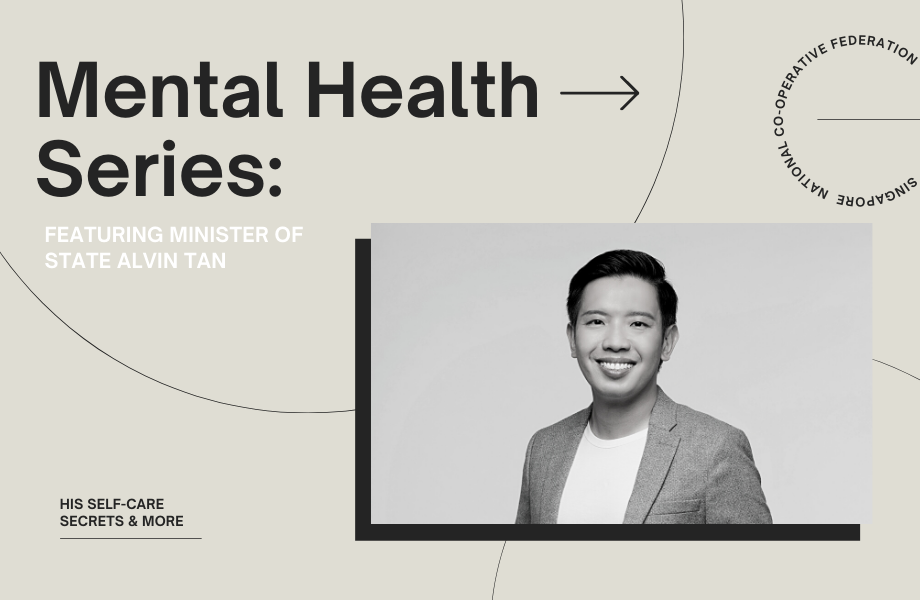

December 2021 Issue: Co-operator Newsletter Quarterly Issue
For Mental Wellness Month, Minister of State Alvin Tan Shares His Self-Care Secrets


On October 10, we commemorate World Mental Health Day. That was a day when we raise awareness on mental health issues and kickstart conversations on or efforts in support of mental health. For the past two years, World Mental Health Day took place amid a special time – that is, during a pandemic where the bulk of our lives have been drastically affected.
By now, we know that our mental health is equally important as our physical health. As conversations on anxiety, burnouts, and depression proliferate, along with the courageous stories of many mental health advocates, we now know that it is okay to not feel okay. And that our emotions, fears, anxiety and challenges are valid. At SNCF, we believe that it is important to keep the discourse on mental wellness, whether it’s on burnouts, or unpacking the murky feelings within you, or what it means to be mentally healthy, going.
In our first story of the three-part series, SNCF spoke to Minister of State for Culture, Community and Youth, and Trade & Industry Alvin Tan, who shared with us his self-care secrets and what the nation is doing to vamp up efforts on promoting mental wellness and resilience.
As someone who walks the ground, what keeps you going and optimistic when things get rough?
The pandemic has been challenging for all of us. In my role, many look to me and other national and community leaders for support, assurance, and answers, especially when things get rough.
There are times where the feedback is rough and emotionally charged. But I try to empathise, listen intently, and try to acknowledge the persons’ feelings and concerns before I respond. Oftentimes, in addition to wanting a resolution to their issues, our people just want a listening ear.
Frankly, taking on other people’s burdens takes a toll on my mental and emotional well-being. I keep optimistic by using positive stories to encourage myself and my team and get my spirits up.
Over the years, conversations on mental health and wellness are aplenty. What does self-care mean to you?
Self-care, to me, means taking care of myself both physically and mentally. I sometimes feel guilty when I’m not working but over time, I’ve learnt to not feel so. I learnt that it’s okay to take time off to take care of myself. This means taking time to work out, spend time with my family, doing the things I enjoy, and sleep!
Do you practice self-care? If so, could you share what are your self-care secrets?
Yes. I’m now trying not to pack my calendar if possible, so I can rest between engagements and meetings. Personally, I’m trying to sleep earlier and better (wearing an eye shade helps!). I also work out often and when things settle, I’d love to get back to football, my favourite sport. Meanwhile, I love cycling and scooting with my wife and children. We do that along the East Coast and Marina Barrage regularly and it really helps us bond as a family.
What are some of the national efforts that have been put in place to destigmatize misperceptions on mental health issues?
To become a society that accepts and support persons with mental health conditions, it is important that we tackle the stigma by addressing the myths and misconceptions surrounding them.
A silver lining from the pandemic is how the issue of mental well-being and health has been brought into the forefront, leading to significant public discourse on the importance of mental health and how we can better support or provide the necessary resources for individuals to seek help.
The Government is committed to addressing mental well-being of our population, including destigmatizing misperceptions on mental health and encouraging those in need to seek help. Since 2018, the National Council of Social Service’s has rolled out the Beyond the Label movement that aims to tackle the stigma faced by persons living with mental health conditions and encourage more open conversations on mental health.
More broadly, the new inter-agency task force on mental health and well-being—which is co-led by the health ministry (MOH) and Ministry of Social and Family Development (MSF)—brings together the capabilities and capacities of different agencies to develop a national action plan on mental health and well-being beyond COVID-19.
What can we do to help destigmatize misperceptions on mental health or provide encouragement for those in need to seek help?
Beyond these efforts, it is important that all of us as a society play a part in tackling the stigma surrounding mental health conditions. For instance, we can start by learning more about mental health and have open discussions to raise awareness. We can also support others who may be facing mental health challenges, as well as do regular check-ins on the people we care about. Most importantly, practice self-care. You can only help others when you are well, physically and mentally.
By Sng Ler Jun
Interview has been edited and condensed for clarity.



